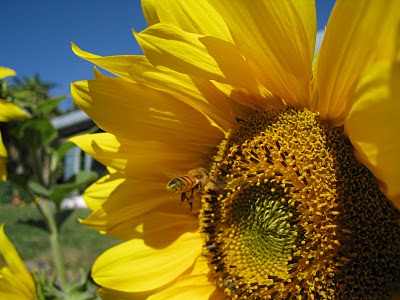
Although most people think of bees as nasty stinging machines and producers of honey, they play a critical role in helping to pollinate fruits and vegetables. Commercial honeybee operations (an industry responsible for producing apples, broccoli, watermelon, onions, cherries, almonds and a hundred other fruits and vegetables) pollinate crops that provide one out of every three bites of food on our tables. In the following video from the TED Talks, Dennis van Engelsdorp (the Acting State Apiarist for Pennsylvania's Department of Agriculture) describes the role that bees (and beekeepers) play in our lives.
In 2006, when beekeepers started complaining about a frightening and unexplained wave of deaths in their bee colonies, farmers became alarmed about the possibility of losing crops. By the time colony collapse disorder had been given a name, there was no mistaking the need to find its cause. Beekeepers were mystified because they were not finding any dead bees within their colonies. Although queen bees seemed to be laying eggs, adult worker bees left their homes and never returned.
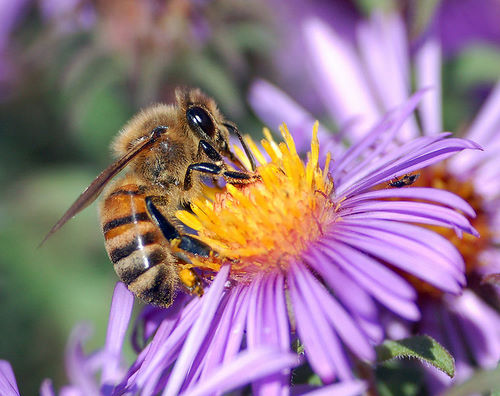
Among those taking notice of this strange and urgent phenomenon were documentary filmmakers. Thus, it's not really surprising to find at least three films about colony collapse disorder. The fact that a relatively new phenomenon could be approached from such wildly different angles offers a perfect chance to examine how, where, and why a filmmaker identifies the approach he will take toward filming his subject.
- The documentarians interviewed some of the same witnesses (including David Hackenberg and David Mendes)
- All three films dealt with the same phenomenon.
- Each documentarian tried to identify the cause of colony collapse disorder.
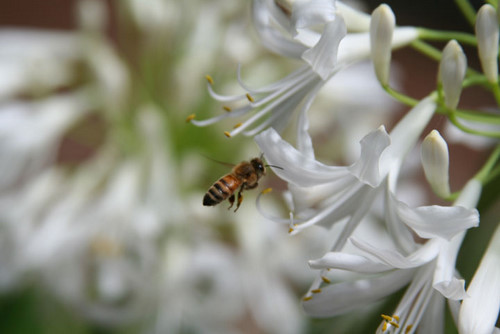
What makes one documentary more credible than the others? The clear triumph of science over faith.
* * * * * * * * * * * * * *
Colony focuses on how colony collapse disorder impacted a California family. Although fairly new to the business of raising honeybees, Lance and Victor Seppi had a steady group of loyal clients among the almond growers of California's Central Valley. Directed by Carter Gunn and Ross McDonnell, Colony took an approach guaranteed to develop an identifiable plot line: follow the money.
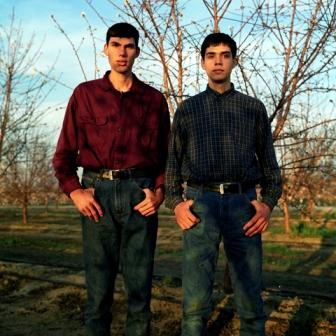
Lance and Victor Seppi
The Seppi brothers have been trying to make it in an industry that many veterans were abandoning as colony collapse disorder destroyed their ability to make a living by using honeybees to pollinate crops. Although Lance and Victor were willing to work hard to build their business, they found themselves caught in the grip of a monstrous agricultural industry. Their clients were trying to negotiate lower prices, their bees were dying off mysteriously, and their hyper-religious mother was furious that the so-called Christians with whom they had been doing business were suddenly refusing to pay them the prices agreed to in their contracts.
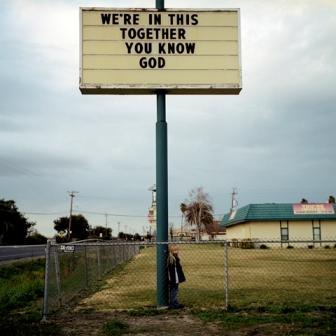
The beekeepers interviewed in Colony are all searching for answers. But it soon becomes obvious that, perhaps blinded by their faith, the Seppi family is not really able to formulate the questions they really need to ask. Despite the obvious photogenic appeal of the two young Seppi brothers, the question of God's role in the business of beekeeping throws Colony way off balance. Here's the trailer:
Colony Trailer from losthillspictures. on Vimeo.
* * * * * * * * * * *
By contrast, Vanishing of the Bees takes a more scientific approach to finding the cause of colony collapse disorder. Directed by George Langworthy and Maryam Henein and narrated by Ellen Page, the documentary includes more footage with David Hackenberg and David Mendes as well as interviews with Michael Pollan (author of such books as Food Rules: An Eater's Manual and The Botany of Desire: A Plant's-Eye View of the World) and Simon Buxton (author of The Shamanic Way of the Bee: Ancient Wisdom and Healing Practices of the Bee Masters).
Vanishing of the Bees also examines how French beekeepers dealt with the problem of colony collapse disorder and finds its answers in how different cultures have affected bees on both sides of the Atlantic. One of the most important discoveries is that organic beekeepers have had no problems with colony collapse disorder. It has only been those beekeepers whose bees fed on crops sprayed with certain systemic pesticides that suffered losses.
One of the most important findings came from simple observation of bees as they tried to collect pollen from large sunflowers. On sunflowers that had not been treated with pesticides, the bees followed an extremely orderly work process. On sunflowers that had been treated with pesticides, the bees lost their orientation, could not do their work, and often fell to the ground in a daze (as if they had become paralyzed by some kind of neurotoxin).
Further probing revealed two vastly different political cultures affecting the health of the bees. In France, the government uses the "precautionary principle" with regard to the use of pesticides. In other words, a pesticide must be proven not to have harmful side effects or else its use will be prohibited. In the United States, where political corruption has contaminated the EPA, most of the studies are conducted by the manufacturers of the very same pesticides that are causing the problems.
Although the French beekeepers were able to identify a specific systemic pesticide manufactured by Bayer -- and came to the conclusion that although the product was not lethal, it did have certain sub-lethal properties which might have interacted with other chemicals -- in America, no one bothered to test for any sub-lethal findings because no one thought it was necessary. Vanishing of the Bees is an important documentary that explains what caused colony collapse disorder, how the cause was identified, and what people can do to prevent its spread. Here's the trailer:
* * * * * * * * *
The latest entry into the field of documentaries about colony collapse disorder is by far the most entertaining of the lot.
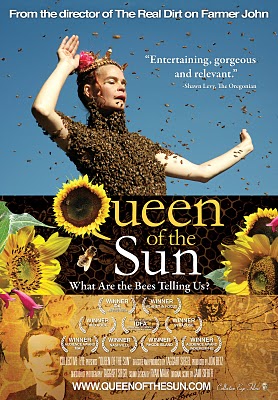
Poster art for Queen of the Sun:
What Are the Bees Telling Us?
Although bees were highly revered by the Egyptians, Mayans, and Greeks, what was once recognized as a sacred partnership between bees and humans has devolved into a profit-driven industry. While other bee films focus exclusively on commercial beekeepers, Queen of the Sun: What Are The Bees Telling Us? emphasizes the biodynamic and organic communities whose opinions are often overlooked by the media despite their profound insights into long-term issues (such as monoculture) that have brought about the recent collapse of the honey bee population. As the film's director, Taggart Siegel, explains:
"Queen of the Sun is for me, a deeply important, crucial and timely film. I first had the idea to make a film on the honey bee crisis, when I read a quote attributed to Albert Einstein (now in dispute) who said 'If bees disappear from the earth, then man will only have four years of life left.' This quote appeared on the back of every major publication about the bee crisis in early 2006. It profoundly affected my view of the future, for both myself, but more importantly, for my daughter."
Taggart's documentary features input from the required group of talking heads (authors Raj Patel and Michael Pollan, physicist Vandana Shiva, botanist Hugh Wilson, entomologist May Berenbaum, and biologist Scott Black). These experts all help to explain the challenges bees face from malnutrition, pesticides, genetically modified crops, pathogens, and lack of genetic diversity from over queen breeding.
A bee working to collect pollen
However, it is the interviews with "biodynamic beekeepers" that will really grab the audience's attention. If one listens carefully to folks like David Heaf, Yvon Achard, Michael Thiele, Gunther Friedmann, and Gunther Hauk, one gets a less clinical and more devoted perspective on the importance of bees to the food chain.
Queen of the Sun has its fair share of eccentric beekeepers. Some are more than happy to explain the factors leading to colony collapse disorder. Others take a more mystical and/or New Age approach toward bees and their importance throughout history (the film has a certain "woo-woo" factor).
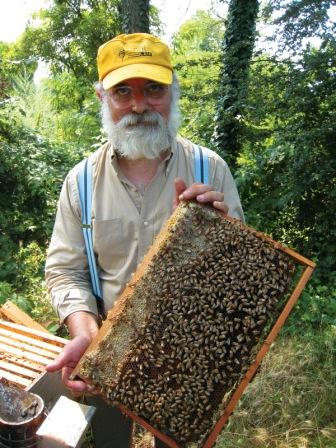
Beekeeper Massimo Carpinteri
Most people are unaware that:
- Artificially bred bees are malnourished on a diet of high-fructose corn-syrup.
- Many are confined in plastic hives and transported thousands of miles (as they are bombarded by exhaust fumes) only to be forced to work in crops soaked in pesticides.
- Because of these conditions, exhausted and weakened pollinators become easy prey for mites, climate change, environmental radiation, viruses, air and water pollution, and the challenging effects of genetically modified crops.
- In order for urban beekeepers to thrive, certain antiquated laws need to be changed.
Although Queen of the Sun has some great archival footage and animation sequences, what really shines is Siegel's spectacular nature photography and his glorious cinematography. Here's the trailer.
To read more of George Heymont go to My Cultural Landscape

